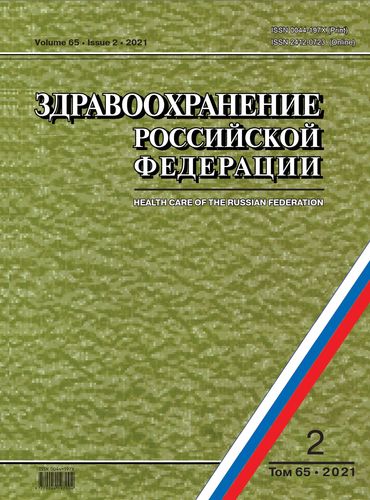On the necessity in unified normative medical lexicon within state language of Russia
- Autores: Balakhonov A.V.1, Mikhaylov S.M.1, Molitvin M.N.1, Stroev Y.I.1, Shulgina O.S.1, Churilov L.P.1
-
Afiliações:
- Saint Petersburg State University
- Edição: Volume 65, Nº 2 (2021)
- Páginas: 166-171
- Seção: DISCUSSION
- ##submission.dateSubmitted##: 25.10.2024
- URL: https://rjeid.com/0044-197X/article/view/637748
- DOI: https://doi.org/10.47470/0044-197X-2021-65-2-166-171
- ID: 637748
Citar
Texto integral
Resumo
Introduction. Unlike other sciences, medicine has not developed a single consistent vocabulary equally understood by all medical specialists. It complicates corporate and professional communication between physicians.
Aim. To analyze the use of the Russian language as a state language in medicine and health care.
Material and methods. Analysis of publications on the problem, including existing regulations and laws and scientific articles and books. A survey of 75 medical doctors, including experienced specialists and novice physicians, on using medical terminology in their professional activities and corporate communication.
Results. The Federal Law does not explicitly stipulate the Russian literary language in professional scientific oral and written speech. However, difficulties inevitably arise in civil and social life when drawing up and reading medical instructions, advertisements, and health insurance contracts. Our survey of medical workers confirmed the reality and urgency of this problem. The absence of normative vocabularies of the professional medical Russian sub-language complicates physicians’ and teachers’ professional activities; negatively affects their communication with each other and with patients/students, reducing the effectiveness of clinical, scientific, and educational medical activities.
Conclusion. The lack of normative reference publications establishing uniform requirements for a medical sub-language at the state level complicates medical practice, reduces the research effectiveness, and affects the education quality. The task is to bring Russian medical terminology in line with the current global medical thesaurus and unify the interpretation of words and concepts by physicians of different specialties, generations, and schools.
Sobre autores
Aleksey Balakhonov
Saint Petersburg State University
Autor responsável pela correspondência
Email: noemail@neicon.ru
ORCID ID: 0000-0001-5321-3825
Rússia
Sergey Mikhaylov
Saint Petersburg State University
Email: noemail@neicon.ru
ORCID ID: 0000-0002-6453-5560
Rússia
Mikhail Molitvin
Saint Petersburg State University
Email: noemail@neicon.ru
ORCID ID: 0000-0002-6757-0185
Rússia
Yuri Stroev
Saint Petersburg State University
Email: noemail@neicon.ru
ORCID ID: 0000-0002-8632-553X
Rússia
Olga Shulgina
Saint Petersburg State University
Email: noemail@neicon.ru
ORCID ID: 0000-0002-3800-6569
Rússia
Leonid Churilov
Saint Petersburg State University
Email: l.churilov@spbu.ru
ORCID ID: 0000-0001-6359-0026
M.D., Ph.D., Assoc. Prof., Chairman of the Department of Pathology, DeputyHead of the Laboratory of Mosaic of Autoimmunity, Saint Petersburg State University, Saint Petersburg, 199034, Russian Federation.
e-mail: l.churilov@spbu.ru
RússiaBibliografia
- The state language of the Russian Federation in the life of modern Russia. St. Petersburg; 2016. (in Russian)
- Balakhonova L.I. About the ways of entering dialectic vocabulary into the modern literary language and its lexicographic representation. In: New Words and Dictionaries of New Words [Novye slova i slovari novykh slov]. St. Petersburg; 1997: 102–13. (in Russian)
- Balakhonov A.V. Integration of scientific knowledge and fundamentalization of higher education. In: Actual Problems of Biology and Ecology [Aktual’nye problemy biologii i ekologii]. St. Petersburg; 2011: 18–28. (in Russian)
- Zagrekova E.N. The origins and development of Russian medical terminology: Diss. Saratov; 2008. (in Russian)
- Dmitrieva E.V. The functioning of medical terminology in the state language (based on the results of a sociolinguistic survey in the city of Bishkek). Vestnik Kyrgyzsko-Rossiyskogo Slavyanskogo universiteta. 2017; 17(9): 116–21. (in Russian)
- Fidaeva L.I. Languages as a tool for effective professional and interpersonal communication (from the experience of teaching professional bilingualism at Kazan State Medical University). In: Languages of Russia and the Near Abroad Countries as Foreign ones: Teaching and Learning. Materials of the III International Scientific and Practical Conference [Yazyki Rossii i stran blizhnego zarubezh’ya kak inostrannye: prepodavanie i izuchenie. Materialy III Mezhdunarodnoy nauchno-prakticheskoy konferentsii]. Kazan’; 2014: 334–8. (in Russian)
- Skakovskaya L.N., Mal’tseva A.A., Monakhov I.A., Klyushnikova E.V., Barsukova N.E. Russian as a Language of Scientific Communications in the CIS [Russkiy yazyk kak yazyk nauchnykh kommunikatsiy na prostranstve SNG]. Tver’; 2018. (in Russian)
- Vlasova O.A. Illness as new anthropological horizon: Ivan Illich’’s critical anthropology. Vestnik Samarskoy gumanitarnoy akademii. Seriya: Filosofiya. Filologiya. 2013; (2): 98–109. (in Russian)
- Balakhonov A.V., Churilov L.P. The language of biology as a keystone of interdisciplinary natural science and education. Biosfera. 2016; 8(2): 235–42. (in Russian)
- Balakhonov A.V., Myasnikov A.A., Stroev Yu.I., Churilov L.P., Fesenko Yu.A. Systemic natural science knowledge and a single language are the cognitive foundation of higher medical education. In: National and Regional Higher Education Models in the Context of European Integration: Merger, Complementarity or Conflict [Natsional’nye i regional’nye modeli vysshego obrazovaniya v kontekste evropeyskoy integratsii: sliyanie, vzaimodopolnenie ili konflikt]. Zurich; 2011: 179–83. (in Russian)
- Orlova E.V. Does a physician need Russian language? Mir russkogo slova. 2012; (1): 31–5. (in Russian)
- Merkulova L.M., Struchko G.Yu., Stomenskaya I.S., Kostrova O.Yu. Features of teaching clinical and fundamental disciplines to English-speaking students. In: Morphological Sciences and Clinical Medicine, Materials of the All-Russian Scientific and Practical Conference with International Participation dedicated to the Centenary of the Birth of V.V. Amosov [Morfologicheskie nauki i klinicheskaya meditsina, Materialy Vserossiyskoy nauchno-prakticheskoy konferentsii s mezhdunarodnym uchastiem, posvyashchennoy 100-letiyu so dnya rozhdeniya V.V. Amosovoy]. Cheboksary; 2019: 22–6. (in Russian)
- Guba T.I. The formation of the professional orientation of students of a medical university in situations of bilingualism: Diss. Volgograd; 2001. (in Russian)
- Logunov T.A., Lymareva M.S. Mastering professional language units as a condition of effective cross-cultural communication. Vestnik Kemerovskogo gosuniversiteta. 2017; (3): 193–7. https://doi.org/10.21603/2078-8975-2017-3-193-197 (in Russian)
- Shirinyan M.V., Shustova S.V. The problems of medical translation and the ways of overcoming difficulties in non-linguistic universities. Yazyk i kul’tura. 2018; (43): 295–316. https://doi.org/10.17223/19996195/43/18 (in Russian)
- Balakhonov A.V. On the creation of an explanatory dictionary of biological terms. Meditsina. XXI vek. 2007; (6): 106–9. (in Russian).
- Churilov L.P., Stroev Yu.I., Utekhin V.I., Tsinzerling V.A., Balakhonov A.V., Molitvin M.N., et al. How to teach a physician-pathologist? Pathophysiology transforms into systems pathobiology serving an introduction into translational medicine. Molekulyarnaya meditsina. 2014; (2): 57–64. (in Russian)
Arquivos suplementares









